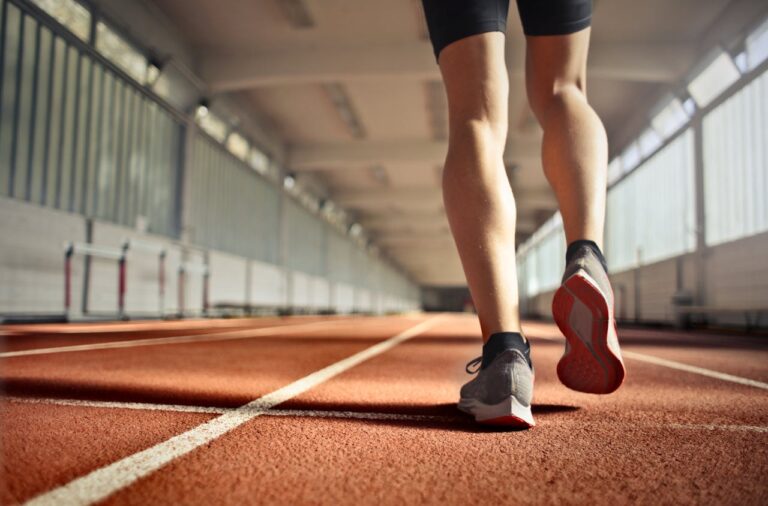Running is a fantastic way to stay fit, explore the outdoors, and challenge your personal limits. However, the repetitive impact of running places significant stress on your feet, making them susceptible to a variety of injuries.
Proper foot care is crucial for any runner, from casual joggers to marathon enthusiasts, to maintain performance and prevent debilitating issues.
Let’s look at 10 essential foot care tips that will keep you running strong and injury-free.
1. Choosing the Right Running Shoes
The foundation of good foot care starts with the right footwear. Not all running shoes are created equal. Consider your foot type (pronated, supinated, or neutral), running style, and the terrain you frequently run on.
• Foot Type
° Pronation (inward rolling of the foot) requires stability shoes.
° Supination (outward rolling of the foot) requires cushioned shoes.
° Neutral types can use a variety of shoes, but neutral shoes are recommended.
• Shoe Fit
° Ensure ample toe room.
° The heel should fit snugly without slipping.
° Try shoes on later in the day when your feet are slightly swollen.
• Shoe Type
° Road running shoes: For paved surfaces.
° Trail running shoes: For uneven, off-road terrain.
° Racing shoes: Lightweight and designed for speed.
2. Preventing Common Running Injuries
Many running injuries stem from overuse or improper foot mechanics. Being aware of these issues is the first step in prevention.
• Plantar fasciitis. This is when the plantar fascia, the tissue that supports the arch of your foot, is inflamed. This is experienced as heel pain, especially in the morning.
Prevention: Stretching, proper arch support, and avoiding overtraining.
• Achilles tendonitis. An inflamed Achilles tendon, which connects the calf muscles to the heel. Symptoms include pain and stiffness in the back of the heel.
Prevention: Calf stretches, gradual increase in training intensity, and supportive footwear.
• Stress fractures. Tiny cracks in the bones of the foot, often caused by repetitive impact. Symptoms include localized pain and swelling.
Prevention: Gradual training progression, proper nutrition (calcium and vitamin D), and appropriate footwear.
• Blisters. Fluid-filled pockets caused by friction.
Prevention: Wearing moisture-wicking socks, ensuring proper shoe fit, and using anti-chafing products.
• Ankle sprains. Occur when the ankle rolls or twists unexpectedly.
Prevention: Strengthening exercises, balance training, and being mindful of uneven terrain.
3. Stretching and Strengthening
• Stretching
° Calf stretches to improve flexibility and reduce Achilles tendon strain.
° Plantar fascia stretches to alleviate tightness and prevent plantar fasciitis.
° Toe stretches to improve flexibility and range of motion.
Strengthening
° Toe curls to strengthen the muscles in the foot.
° Heel raises to strengthen the calf muscles.
° Balance exercises to improve stability and prevent ankle sprains.
4. Proper Foot Hygiene
Maintaining good foot hygiene is critical for preventing infections and other issues.
• Keep feet clean and dry. Wash feet daily with soap and water, and make sure to dry thoroughly, especially between the toes.
• Trim toenails properly. To prevent ingrown toenails, don’t cut around your nail shape but straight across.
• Wear clean, moisture-wicking socks. Choose socks made from breathable materials like merino wool or synthetic blends. Change socks daily to prevent moisture buildup.
5. Consider Custom Orthotics
For runners with specific foot conditions or biomechanical issues, custom orthotics can provide significant benefits. If you are experiencing foot pain, looking for a way to improve your performance, and are in the GTA, consider custom orthotics in Kitchener.
6. Listen to Your Body and Avoid Overtraining
Overtraining is a common cause of running injuries. Pay attention to your body’s signals and allow for adequate rest and recovery.
• Gradual progression. Increase mileage and intensity gradually to avoid overloading your feet. Follow the 10% rule: Don’t increase your weekly mileage by more than 10%.
• Rest and recovery. Allow for rest days to allow your feet to recover. Incorporate cross-training activities to reduce repetitive stress.
• Recognize pain signals. Don’t ignore pain. It’s your body’s way of telling you something is wrong. Seek professional help if pain persists (see next point).
7. Seek Professional Help When Needed
If you experience persistent foot pain or discomfort, don’t hesitate to seek professional help from a podiatrist or sports medicine specialist.
• Podiatrists…
° Can diagnose and treat foot conditions.
° Provide expert advice on footwear and orthotics.
° For those in Ontario, there are some good foot clinics in North York.
Sports medicine specialists…
° Can address sports-related injuries and provide rehabilitation guidance.
° Help develop a training plan that minimizes injury risk.
8. Foot Care and Overall Health
• Circulation. Proper foot care promotes healthy blood flow. Poor circulation can lead to complications, especially for individuals with diabetes.
• Posture and alignment. Foot problems can affect posture and alignment, leading to pain in other areas of the body.
Physiotherapy and rehab clinics such as PARC of Ontario provide valuable assistance in this regard.
9. Hydration and Nutrition
Proper intake of food and water is essential for overall health, including foot health.
• Hydration. Dehydration can cause fatigue and muscle cramping. This puts you at increased risk of injury. So drink plenty of water before, during, and after runs.
• Nutrition. A healthy, balanced diet supports bone health and muscle recovery. Ensure adequate intake of calcium, vitamin D, and protein.
10. Regular Foot Inspections
Regularly inspecting your feet can help you identify potential problems early on.
• Check for…
° Blisters, cuts, and abrasions.
° Redness, swelling, and signs of infection.
° Changes in skin or nail appearance.
• Address issues promptly
° Treat minor issues like blisters with appropriate care.
° Seek professional help for more serious concerns.
Remember, prevention is key, and taking care of your feet is an investment in your overall health and performance. Happy running!
Enjoyed this? Share this post with fellow fans and influencers, and be sure to check back regularly for the latest updates, insights, and news on all things simpcity!

